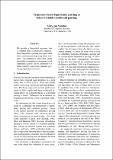Files in this item
Transition-based dependency parsing as latent-variable constituent parsing
Item metadata
| dc.contributor.author | Nederhof, Mark Jan | |
| dc.date.accessioned | 2016-08-12T23:34:21Z | |
| dc.date.available | 2016-08-12T23:34:21Z | |
| dc.date.issued | 2016-08-12 | |
| dc.identifier | 243585471 | |
| dc.identifier | ac34e2d7-eac6-4eca-b42a-2a680c54f30f | |
| dc.identifier.citation | Nederhof , M J 2016 , Transition-based dependency parsing as latent-variable constituent parsing . in Proceedings of the SIGFSM Workshop on Statistical NLP and Weighted Automata . Association for Computational Linguistics , Berlin , pp. 21-31 , 54th Annual meeting of the Association for Computational Linguistics , Berlin , Germany , 7/08/16 . | en |
| dc.identifier.citation | conference | en |
| dc.identifier.isbn | 9781945626135 | |
| dc.identifier.other | ORCID: /0000-0002-1845-6829/work/46002698 | |
| dc.identifier.uri | https://hdl.handle.net/10023/9298 | |
| dc.description.abstract | We provide a theoretical argument that a common form of projective transition-based dependency parsing is less powerful than constituent parsing using latent variables. The argument is a proof that, under reasonable assumptions, a transition-based dependency parser can be converted to a latent-variable context-free grammar producing equivalent structures. | |
| dc.format.extent | 11 | |
| dc.format.extent | 248891 | |
| dc.language.iso | eng | |
| dc.publisher | Association for Computational Linguistics | |
| dc.relation.ispartof | Proceedings of the SIGFSM Workshop on Statistical NLP and Weighted Automata | en |
| dc.subject | Automata theory | en |
| dc.subject | Parsing algorithms | en |
| dc.subject | P Language and Literature | en |
| dc.subject | QA75 Electronic computers. Computer science | en |
| dc.subject | NDAS | en |
| dc.subject.lcc | P | en |
| dc.subject.lcc | QA75 | en |
| dc.title | Transition-based dependency parsing as latent-variable constituent parsing | en |
| dc.type | Conference item | en |
| dc.contributor.institution | University of St Andrews. School of Computer Science | en |
| dc.date.embargoedUntil | 2016-08-12 |
This item appears in the following Collection(s)
Items in the St Andrews Research Repository are protected by copyright, with all rights reserved, unless otherwise indicated.

